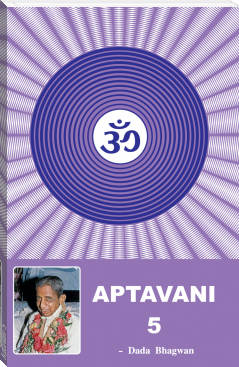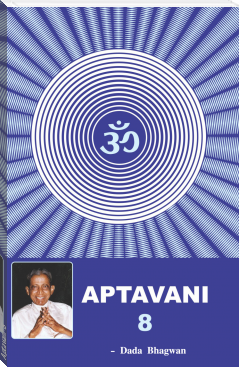Aptavani-9 by Dada Bhagwan (i can read with my eyes shut txt) 📕

Read free book «Aptavani-9 by Dada Bhagwan (i can read with my eyes shut txt) 📕» - read online or download for free at americanlibrarybooks.com
- Author: Dada Bhagwan
Read book online «Aptavani-9 by Dada Bhagwan (i can read with my eyes shut txt) 📕». Author - Dada Bhagwan
Worldly things are not the impediments to liberation but my-ness is. The object for which there is my-ness will be the binding object. In fact, what object belongs to us when in the end, even the body does not accompany us!
The one, who dies without my-ness, attains liberation. The one with my-ness is not allowed entry in liberation.
To have the knowledge of ‘my-ness is wrong,’ is the highest earning in life.
Akram Vignan clarifies this all the way, that the one who has my-ness is not the Self.
‘My-ness’ (mamata) in the one who has attained Self-realization is ‘dramatic’ my-ness. It is the same my-ness as that in a drama (the same my-ness an actor has playing his role; it is perfunctory).
The pleasure that is there when there is no my-ness is the pleasure of the free mind!
The person who has no intense insatiable greed (lalacha) in life will find God!
A person with only one type of greed is called greedy. There is a difference between a lalachu (an intensely greedy person) and a lobhi (greedy). The greedy has greed in one aspect only, whereas a lalachu person is greedy in all aspects. He has an intense insatiable greed to enjoy this way and that way. For such a person, it is difficult to be free. Intense insatiable greed makes one lose sight of the goal. He will be trapped everywhere. The lalachu will self-destruct in every manner.
The intense insatiable greed arises out of the desire to enjoy worldly pleasures. With such greed, there is no rule or law. One will snatch pleasure from here or there, by any means he can.
Horrible pains are invited by the intense insatiable greed for sexual pleasure. Disgust towards sexual pleasure will give freedom from sexuality. As long as there is intense insatiable greed for any sexual pleasure, clashes will be there. One binds terrible enmity through greed of sexual pleasure. The one who is intensely greedy for sexual pleasure, will even use intimidation as a final resort in order to enjoy sexual pleasure.
The intense insatiable greed for sexual pleasure will make one helpless. So the wife will make him dance like a monkey. And later, will there not be revenge against each other?
A lalachu person will not only have lalacha for sexual pleasures but he will also have lalacha for eating, drinking and traveling; he is lalachu in all things.
It is an inner spiritual endeavor (purusharth) to change thoughts for intense insatiable greed when they occur. Then, one is not responsible and if those thoughts are not changed.
A lalachu person, due to being stricken with the intense insatiable greed, will take all kinds of risks.
A lalachu wants everything. In the same way as a disease attracts the remedy, all objects of intense insatiable greed are attracted to the intensely greedy one.
Only those businesses that are in one’s prakruti (innate nature) can be performed. Out of intense insatiable greed one gets into imaginary businesses and consequently gets into trouble.
Why should there be intense insatiable greed (lalacha) for temporary things? When a decision ‘I don’t want any temporary thing in this world’ is made, lalacha will go away.
Lalacha is an inborn thing. At the time of death, the seed of lalacha will carry forward with one and it will grow in the next life.
If intense insatiable greed (lalacha) is opposed by the ego, it will go away. But then later, that ego must be washed away too. Any ailment can be removed in the presence of a Gnani Purush. The other remedy to be free from lalacha is to stop doing all things that cause it. One must not think about them and if they come into his thoughts, he should do pratikraman, and then one day, he may be free from all that tempts him.
The lalachu is a betrayer. He will completely ignore and bypass the Agnas of the Gnani Purush; therefore the grace of Gnani Purush will stay away from him. Only if he makes a strong decision to remain in the Gnani’s Agnas, and becomes very strong with his mind, body and speech, then there is a possibility that the intense insatiable greed (lalacha) will leave.
The lalachu can’t give happiness to anyone in the world; he will give only pain.
The effect of bad company, leads to an intense insatiable greed creeping within one. The effect of bad company is worse than poison.
Lalacha does not let Gnan express. It stops at the level of the intellect only.
At first, one sees his own mistakes, and then the pratiti (conviction of ‘it is wrong to have these mistakes’) is established. Once this is firmly established, these mistakes of lalacha can be rid of by one’s inner spiritual endeavor (purusharth).
The intense insatiable greed to be worshipped will make one organize groups that will worship him. What is the outcome of doing this? He will go to hell. To become a guru and enjoy that status is also the same as having an intense insatiable greed! This intense insatiable greed is regarded as a terrible disease. If you want to get rid of this horrible disease that perpetuates the worldly life, spend one lifetime in subservience to the Gnani Purush. One should not open up his own ‘shop’ after meeting the Gnani Purush.
Even God will not question the one who has no greed for anything at all.
5. Pride (maan) : Ego of doer-ship (garva) : Wallowing in worldly pleasures (garavata)
The Gnani Purush informs us that gnanavarniya karma i.e. the karma that obstructs the full expression of the knowledge of the Self, goes once mohaniya karma i.e. the karma that causes the illusion, is removed. Speaking about himself, The Gnani Purush asks, ‘What kind of moha (illusion-attachment) did I have prior to enlightenment?’ He says ‘I did not have any moha of any kind. I had no inclination for money or sex. The only thing I did have was pride (maan); great attachment with pride. However, there was no abhimaan which is pride with ‘my-ness (mamata)’. Abhimaan can only exist if there is my-ness (mamata). This was pride without any my-ness – this was maan without mamata.
If from a young age one has been subjected to only insults, he will have a strong appetite to gain respect. In the same token if one had nothing but respect given to him in childhood, the appetite for respect will not be there later on.
When a maani (one with a tuber of pride) gets respect, his tuber of greed (lobh) will decrease. Whereas a lobhi will not let go of his tuber of greed; there will be no decrease in his greed, even when he gets a lot of respect.
From the perspective of liberation, simple pride is tolerable, but for one to be constantly using his energies in being preoccupied with, ‘where will I get respect from, how can I get respect and recognition in the eyes of the world?’ is gravely dangerous. Pride can be removed but it is extremely difficult to eradicate the hunger for pride.
If people give you respect, you should enjoy it but do not become habituated by it. You should be careful not to become attracted and then attached to the one who gives you respect.
In the process of enjoying respect, awareness of the Self is diminished and if deceit enters into making one wanting respect, there will be total darkness. There is no objection in enjoying respect that comes naturally but if it leads to covetousness for wanting more respect (maan will increase) then this deformity of pride results in intoxication of pride; that is objectionable. The very existence of pride makes one ugly, and then he cannot be attractive. One’s pride persists because there is an inherent belief in one that others are inferior.
Can the one who loves respect, love insult with the same intensity? A constant awareness that avoids being insulted is verily beggary for pride.
Who is the one who receives insults and respects? Is it the Soul i.e. the real Self? No. This is the affliction of the ego. If you are the Self, no one can insult you. Does respect or insult have any connection to the Soul?
In Akram Vignan, You become separate the moment You say, ‘the one who was insulted is not I’.
If you see the person insulting you as obliging you, then it will erode the pride within.
In the ignorant state (non-Self-realization state) if the fear of insult leaves, one becomes shameless and hurtful to others, whereas if the fear of insult leaves after one receives Gnan, one becomes completely independent.
There are various phases of pride (maan): Pride with my-ness (abhimaan), false arrogance (ghamand), hot temper (tumakhi), head strong (tundmijaji), self-respect (swamaan), false pride and false my-ness (mithyabhimaan).
When one says, ‘My name is Lalvo’, recognize that he is only egotistic. There is only ego. (Lalvo is a nickname for Lallu. Nicknames are typically used for peons.). When he says, ‘I am Lallubhai’, means that there is also pride along with the ego (with ‘bhai’ there is emphasis on the self – adding ‘bhai’ to a name is similar to adding the title of ‘Mr.’). ‘I am Lallubhai the lawyer, did you not recognize me?’ That is ego with rich materials (ego of showing of his material wealth and achievements); it is pride with my-ness (abhimaan.) When a person claims ‘I can beat you’ but he has no strength to do so; that is called ghamand. If a person does not have a drop of knowledge nor any money and yet has a lot of arrogance, he is called a tundmijaji . The one with tumakhi will insult and scorn respected members of the community! A ghemraji issomeone who has no substance within and without, and yet puts everyone down. He would say, ‘I can travel around the whole world’ when he is not capable of going even two miles.
Hum is different and ahamkar is different. ‘Hum…hum…I am everything’ is different, and the ego (ahamkar) is different. Ego can go away but the ‘Hum’ does not go away easily, it arises where there is nothing. ‘Hum’ is different from ‘I am something’!
Ego is the false imposition of the Self, saying ‘I am’ where the ‘I’ is really not. The ego is present in everyone except in the Gnani Purush.
Extension of ego is pride (maan). Pride associated with my-ness (mamata) is abhimaan. To show off, ‘this is my house…this is my car… is ego with my-ness (abhimaan).
Where there is abhimaan, there is no saiyam;meaning a state without inner anger, pride, deceit or greed (kashayas); there is only ignorance there.
The belief of ‘I am Chandulal’ is ego and ‘I am pure Soul’ is the egoless state. After Self-realization, the main ego, the charging ego that charges new karma is gone but the results of previous charging which is the discharge ego, still remains. Absolute knowledge will arise when all the results of this discharge ego are gone.
One must uphold the intention of ‘Let no living being be hurt through this ego’. Yet, if someone gets hurt one should do pratikraman for it and move on.
What is the difference between pride (maan) and self-respect (swamaan)? Pride is ego with





Comments (0)